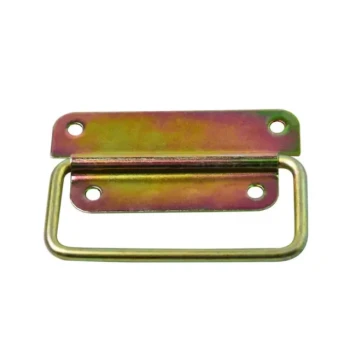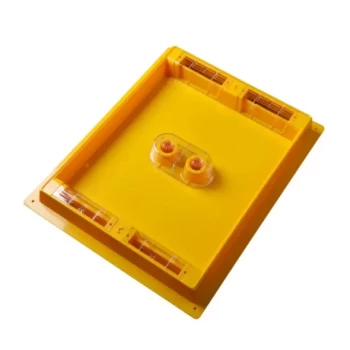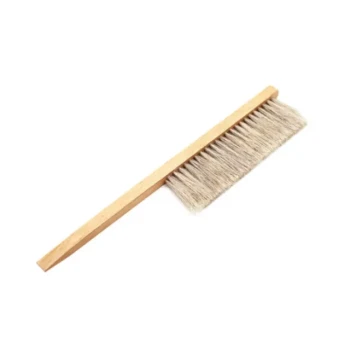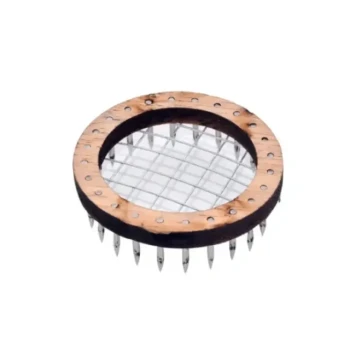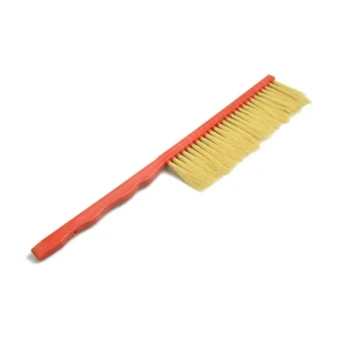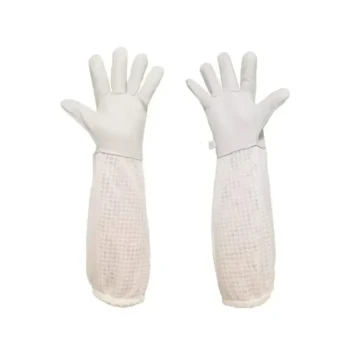To be direct, plastic beehives are significantly lighter than their wooden counterparts. A standard wooden beehive assembly can weigh dozens of kilograms, whereas a plastic hive of the same dimensions may weigh up to half as much, creating a substantial difference in handling and management.
The choice between plastic and wood is not just about weight; it's a fundamental decision that impacts your daily beekeeping tasks. While plastic's lighter weight offers clear advantages in mobility and physical ease, it's part of a larger trade-off involving maintenance, durability, and long-term apiary goals.
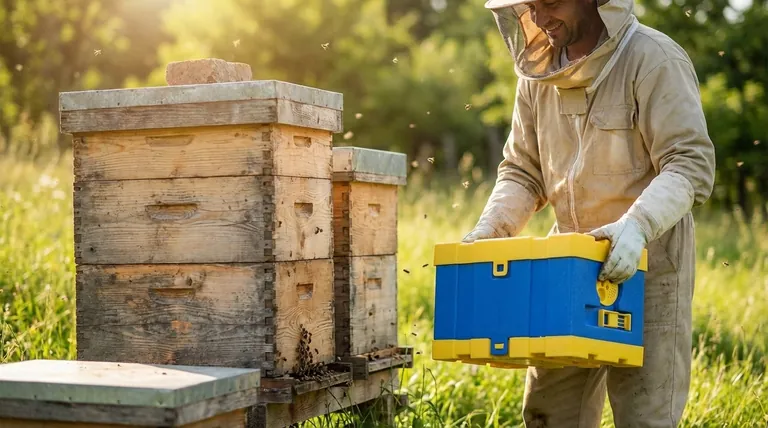
The Practical Impact of Weight on Beekeeping
The weight difference between hive materials is not a minor detail—it directly affects the physical demands of beekeeping. This becomes especially critical as you manage more colonies or as you age.
Easier Hive Inspections
Routine inspections require you to lift and separate heavy boxes (brood chambers and honey supers). A fully-laden wooden honey super can be incredibly heavy.
Using lighter plastic equipment reduces the strain of this repetitive, essential task, making inspections faster and less physically taxing.
Simplified Transportation
For beekeepers who move their hives for pollination or to follow nectar flows, weight is a primary concern. The cumulative weight difference across dozens of hives can be enormous.
Lighter plastic hives make loading, unloading, and relocating colonies a much more manageable operation.
Reduced Overall Physical Strain
Beekeeping involves constant lifting. The reduced weight of plastic components lessens the cumulative strain on your back and joints over the course of a season and a beekeeping career.
Understanding the Trade-offs
Choosing a hive material based solely on weight would be a mistake. Each material comes with a distinct set of advantages and disadvantages that you must weigh against your personal beekeeping philosophy and goals.
Maintenance and Durability
Wooden hives require regular maintenance, including painting or sealing, to protect them from moisture and weather damage. Over time, wood can warp or rot if not cared for.
Plastic hives are inherently weather-resistant and do not rot. They are durable and require minimal upkeep beyond cleaning.
Pest and Disease Resistance
The non-porous surface of plastic makes it more resistant to pests like wax moths and diseases like American Foulbrood. Plastic is also easier to sterilize thoroughly if a colony is lost to disease.
Wood is porous, which can harbor pathogens, and can be more difficult to completely sanitize.
Initial Cost and Environmental Impact
Wooden hives are often less expensive upfront and are made from a renewable, recyclable, and biodegradable material.
Plastic hives can have a higher initial cost. They are derived from non-renewable resources and are generally not recyclable at the end of their lifespan.
Making the Right Choice for Your Apiary
Your decision should be guided by your specific priorities, physical abilities, and the scale of your operation.
- If your primary focus is mobility and ease of handling: Plastic is the superior choice due to its significantly lower weight, which simplifies inspections and transport.
- If your primary focus is tradition and environmental sustainability: Wood is the classic, renewable material that has been used for centuries.
- If your primary focus is low maintenance and long-term durability: Plastic's resistance to weather, pests, and rot makes it an excellent set-it-and-forget-it option.
Ultimately, the best hive material is the one that keeps you engaged and effective as a beekeeper.
Summary Table:
| Feature | Plastic Hives | Wooden Hives |
|---|---|---|
| Weight | Significantly lighter (up to 50% less) | Heavy, especially when laden |
| Maintenance | Low; weather-resistant, no rotting | High; requires painting/sealing |
| Durability | High; durable, pest/disease resistant | Can warp or rot over time |
| Initial Cost | Generally higher | Generally lower |
| Environmental Impact | Non-renewable, not easily recyclable | Renewable, biodegradable material |
Ready to upgrade your apiary with durable, lightweight equipment?
As a trusted wholesale supplier to commercial apiaries and distributors, HONESTBEE provides high-quality beekeeping supplies designed to reduce physical strain and increase operational efficiency. Our plastic hives offer the durability and low maintenance that growing operations need.
Contact our team today to discuss wholesale pricing and how our equipment can benefit your business.
Visual Guide
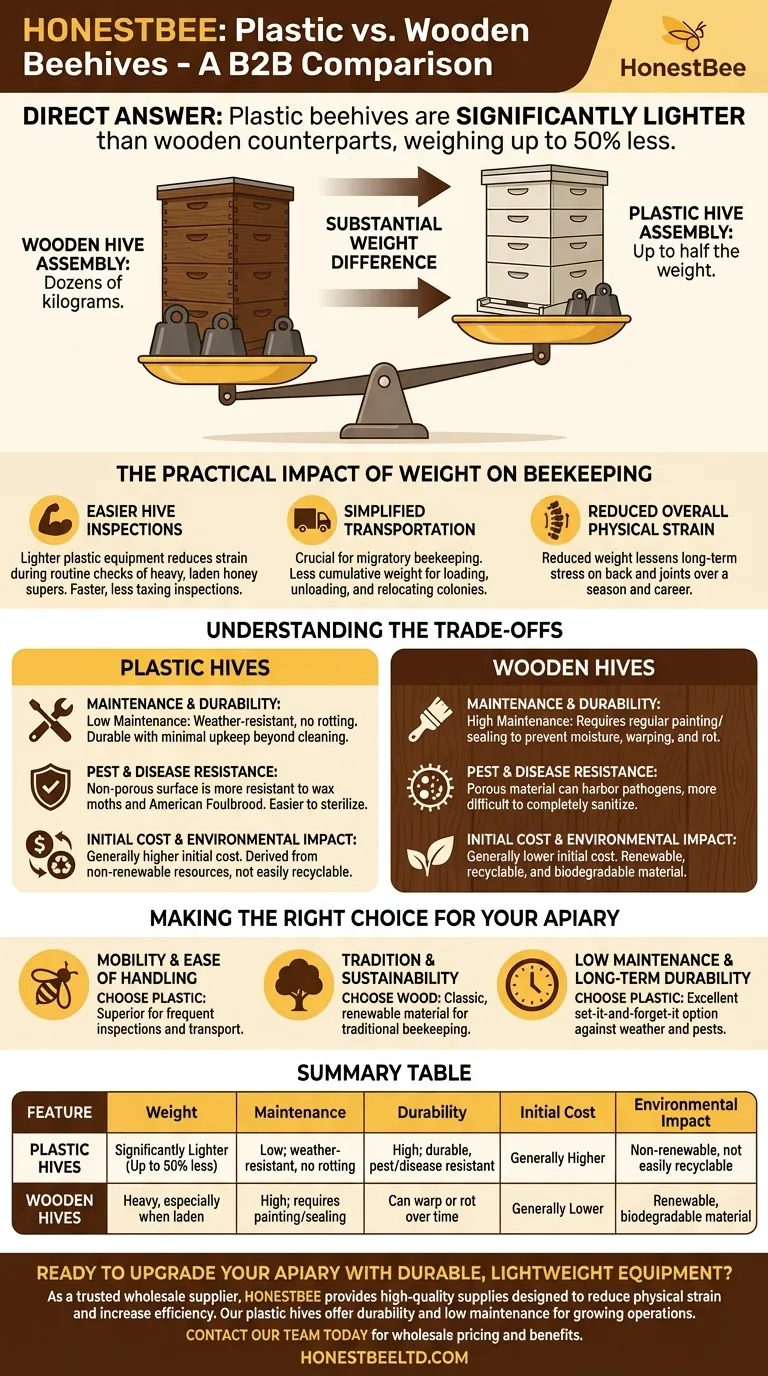
Related Products
- 4 Frame Plastic Nuc Boxes for Beekeeping Bee Nuc Box
- Professional Galvanized Hive Strap with Secure Locking Buckle for Beekeeping
- Professional Drop-Style Hive Handles for Beekeeping
- Professional Hive Top Bee Feeder for Beekeeping
- Professional Hive Front Entrance Bee Feeder
People Also Ask
- When can nucleus colonies (nucs) be created? Optimal Timing for Apiary Growth and Survival
- How can creating a nuc be used for swarm control? Prevent Bee Loss with Strategic Splitting Techniques
- What is the function of nucleus (nuc) boxes in commercial beekeeping? Scale Your Apiary with Strategic Asset Management
- What are the immediate steps for installing a bee nuc upon arrival? Tips for Colony Success
- What is a flexible method for creating a nucleus hive? Master Split Management with Standard Equipment


